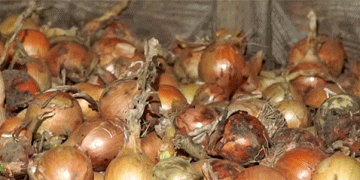In the Grodno region of Belarus, the onion harvest is underway, and the mood is decidedly optimistic—a stark contrast to the shortages experienced the previous spring. The agricultural enterprise “Vasilishki” is reporting exceptional results, with yields exceeding 500 centners per hectare (approximately 50 metric tons/ha) and individual bulbs reaching weights of up to 700 grams. This bounty is attributed to a precise fertilization strategy and favorable, albeit initially challenging, weather conditions that ultimately supported strong growth.
The real story, however, lies not just in the field, but in the new market mechanisms being deployed. To prevent a repeat of last year’s deficit, the government has instituted a system of forward contracts for the state stabilization fund. This means producers like “Vasilishki” are now signing agreements before harvest, guaranteeing a buyer for their stored produce at predetermined prices and volumes. As Director Anton Burnos explains, this provides crucial “insurance for the producer,” offering financial predictability similar to long-standing systems for wheat and sugar beet.
The scale of this intervention is significant. In Grodno region alone, the state order comprises almost 5,000 tons of onions. From this total, 1,360 tons will be placed into a 6-month strategic reserve to meet the region’s needs, including 265 tons earmarked for social institutions like schools and hospitals. To support this, the state is providing a 30% advance payment to producers upon delivery to the fund, injecting immediate liquidity into farming operations. The system is backed by enforceable penalties for both producers and buyers who fail to meet their contractual obligations, ensuring all parties remain committed.
Belarus’s proactive approach to managing its onion supply demonstrates a strategic shift from reactive crisis management to planned market stabilization. By combining high-yield agricultural production with a structured, financially-backed forward contracting system, the country is directly addressing the core challenges of seasonal gluts and inter-seasonal shortages. For agricultural professionals globally, this model highlights the critical importance of de-risking production for farmers through guaranteed offtake agreements. It proves that ensuring a stable food supply requires not just success in the field, but also intelligent design in the marketplace.































